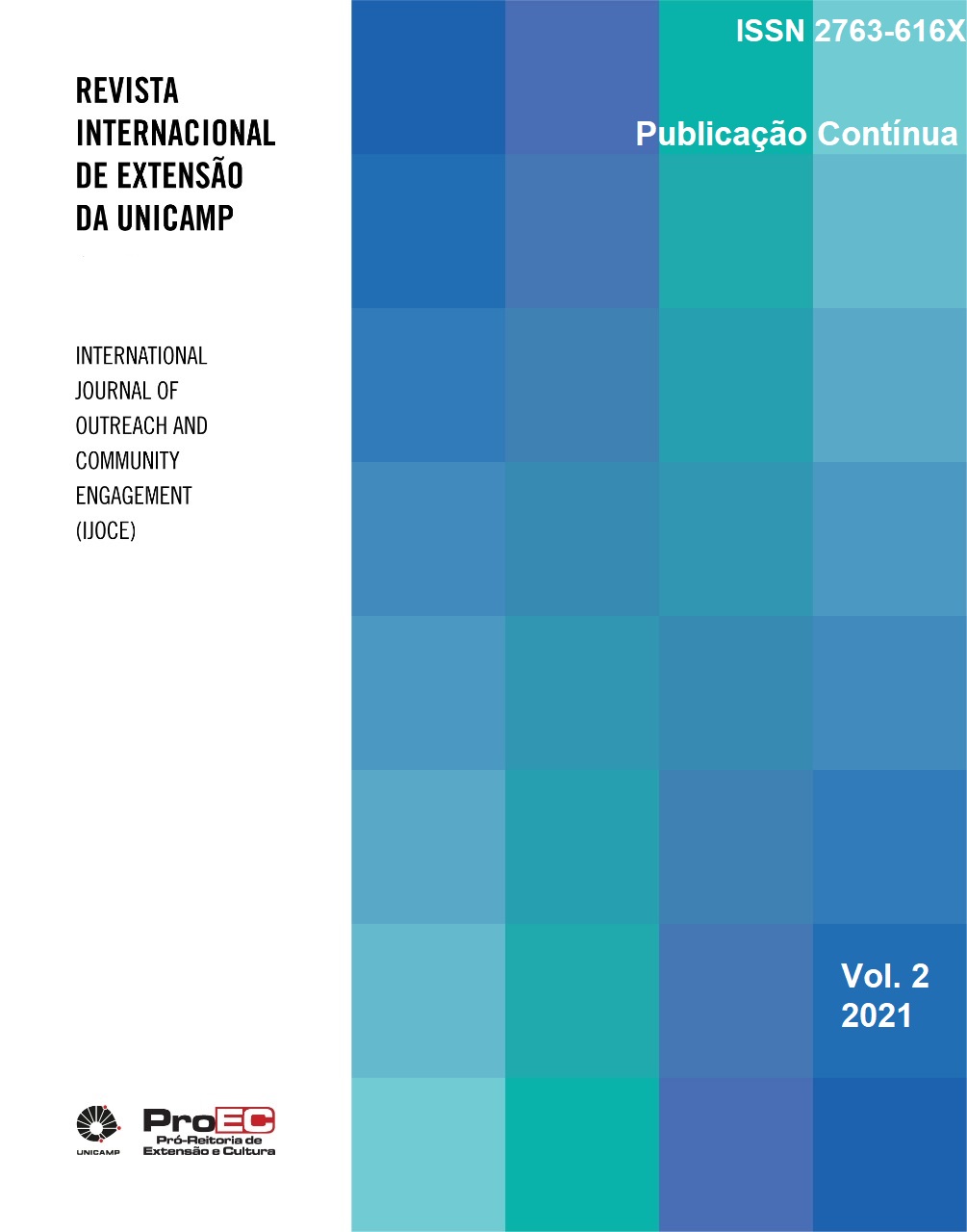Abstract
The model of Environmental Education (EE) in which we believe in is based on Radical Affectivity, a fundamental empathic way of understanding the collective wish of taking care of common goods. The Environmental Education Group of University of Santa Catarina's members work with affection as environmental educators on extension projects, based on the main principles of the National Policy of University Extension (2012). Extension programs and EE's interactions generate relationships that make way for some concerns, like how does educating with affection affects us? Affection is used as a way of measuring the formative process' evolution. Considering this, the main objective of this article is to formulate guidelines for the process of self-evaluation of the extensionist students that work with EE. Hence, Affection is used as a way of measuring the formative process' evolution. The methodology consists of analysing the collection of recorded EE experiences through the year of 2019 at Municipal Elementary School Beatriz de Souza Brito. The result of that work germinated in an ecology of subjectivity, in which are present aesthetic, grammatical and intentional patterns. After researching the documents, we realized that the Radical Affectivity and the action-with-reflection were both present on the actions and their records. Thus, we affirm that the extensionist students' formative process, when developed in the way we propose, is necessarily (trans)formative and should be monitored through the lens of Affect. The guidelines are proposed in a manner of questions that should help with the perception of those transformations.
References
Carvalho, I. C. M. (2012). Educação Ambiental: A formação do sujeito ecológico (6a ed, p. 255). São Paulo: Cortez.
Degasperi, T. C., & Bonotto, D. M. B. (2017). Educação ambiental e as dimensões cognitiva e afetiva do trabalho com valores: produzindo sentidos. Ciênc. Educ., 23(3), 625-642. https://doi.org/10.1590/1516-731320170030006
Dagnino, R. (2015). Como é a universidade de que o Brasil precisa? Avaliação, 20(2), 293-333. Disponível em: htps://www.scielo.br/pdf/aval/v20n2/1414-4077-aval-20-02-00293.pdf
FORPROEX - Fórum de Pró-Reitores das Instituições Públicas de Educação Superior Brasileiras. (2012). Política Nacional de Extensão Universitária. Manaus. Disponível em: https://proex.ufsc.br/files/2016/04/Pol%C3%ADtica-Nacional-de-Extens%C3%A3o-Universit%C3%A1ria-e-book.pdf
Fraga, L. (2017). Transferência de conhecimento e suas armadilhas na extensão universitária brasileira. Avaliação, 22(2), 403-419. http://dx.doi.org/10.1590/S1414-40772017000200008
Freire, P. (2018). Extensão ou Comunicação? (de Oliveira, R. D., Trad., 18a ed., p. 128). Rio de Janeiro: Paz e Terra.
Freire, P. (2018). Pedagogia da autonomia: saberes necessários à prática educativa (57a ed, p. 143). São Paulo: Paz e Terra.
Fronza, F. E., Andrade, I. T., & de Almeida Mohedano, R. (2019). Núcleo de Educação Ambiental da UFSC e o Programa de Formação Continuada de Educadoras e Educadores Ambientais para uma Cultura da Sustentabilidade. REMEA-Revista Eletrônica do Mestrado em Educação Ambiental, 36(2), 253-274.
Gadotti, M. (2013). Pedagogia da Terra (7a reimpressão, p. 218). São Paulo: Fundação Peirópolis.
Guimarães, L. B., Sampaio, S. M. V. (2014). Educação ambiental nas pedagogias do presente. Em aberto, 27(91), 123-134. Disponível em: http://rbepold.inep.gov.br/index.php/emaberto/article/viewFile/2425/2382
Maturana, H. (1998). Uma abordagem da educação atual na perspectiva da biologia do conhecimento. In Maturana, H. (Org), Emoções e linguagem na educação e na política (11-79). Belo Horizonte: Editora UFMG
Ministério do Meio Ambiente & Ministério da Educação. (2004). Formando Com-Vida - comissão de meio ambiente e qualidade de vida na escola: construindo agenda 21 na escola (p. 42). Brasília: Coordenação Geral de Educação Educação Ambiental. Disponível em: https://www.mma.gov.br/estruturas/educamb/_arquivos/com-vida.pdf
Vasconcelos, L. G. C. (2018). Da ecologia à afetividade radical: por uma educação ambiental orientada aos afetos. ClimaCom, 5(11). Disponível em: http://climacom.mudancasclimaticas.net.br/da-ecologia-a-afetividade-radical-por-uma-educacao-ambiental-orientada-aos-afetos/
Silva, D. J. (2015, outubro). Os Fundamentos Emocionais da Educação Ambiental. Encontro Blumenauense de Educação Ambiental (EBEA), Blumenau, Santa Catarina, Brasil, 2.
Tozoni-Reis, M. F. D. C. (2006). Temas ambientais como temas geradores: contribuições para uma metodologia educativa ambiental crítica, transformadora e emancipatória. Educar em revista, 27, 93-110.

This work is licensed under a Creative Commons Attribution-NonCommercial 4.0 International License.
Copyright (c) 2021 Mariana de Souza Zorzo, Rodrigo de Pinho Franco, Thiago Teixeira Mendonça

